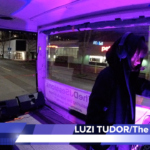Netflix’s Kanye West Documentary Didn’t Defame Woman by Showing Her Intoxicated, Judge Rules

A woman who once appeared “obviously intoxicated” in a Kanye West music video cannot sue for defamation after the footage was used in the Kanye-focused Netflix documentary jeen-yuhs, a federal judge says, even if she later got sober and “turned her life around.”
Cynthia Love sued last year, claiming jeen-yuhs filmmakers Coodie Simmons and Chike Ozah defamed her by including the footage in the 2022 Netflix series. The clip, which showed Love dancing and slurring her words at a Chicago barbecue spot, was originally shot for the 2003 music video for Kanye West’s debut single, “Through The Wire.”
Love’s argument was unusual. She admitted that the footage was authentic — normally the death knell for a libel lawsuit. But she argued that because she had later gotten sober, it had become false and defamatory to use it in the present day.
In a ruling Tuesday (Feb. 27), Judge Steven Seeger sharply rejected that argument, ruling that the footage was “historically accurate” and shows a “a past truth,” even if it was a truth that Love did not want to remember.
“Holding up a mirror isn’t defamation. Holding up a 20-year-old picture isn’t defamation, either,” the judge wrote. “They both reflect reality, like it or not.”
It did not matter that Love had later “turned things around,” the judge wrote, or that the Netflix doc depicts her at her “darkest moments” years ago: “The ‘Jeen-yuhs’ video accurately portrays Love in a moment of time several decades ago. The video does not suggest that Love remains in an intoxicated state, or anything of that sort.”
Directed by Coodie & Chike (the moniker used by the filmmakers), jeen-yuhs depicted West’s career through unreleased archival footage, much of it filmed by Coodie over decades of working with the rapper. After landing at Netflix for a reported $30 million, the series was released in February 2022 — just months before West would receive widespread condemnation for a string of antisemitic statements.
Years earlier, Love had briefly appeared in the “Through The Wire” video, which was directed by Coodie & Chike in one of their first projects. The video showed Love drunkenly dancing in Chicago eater Original Leon’s Bar-B-Q. That footage, plus additional unused footage showing her interacting with West, later appeared in jeen-yuhs, making up about two minutes of footage total across two episodes.
Love sued last year, accusing Coodie & Chike and Netflix of defamation and a wide range of other wrongdoing. (West was not named or accused of any wrongdoing). She claimed they had “recklessly disregarded the truth” that she had made “an amazing transformation” since the ugly footage was filmed, hurting her reputation among present-day peers: “Neighbors, co-workers, and family cannot help but view and treat her as someone less worthy of their respect, esteem and trust,” her lawyers wrote.
But in Tuesday’s order dismissing those allegations, Judge Seeger pointedly noted that “sometimes the truth hurts, and when the truth hurts, it isn’t defamation.” Summarizing her argument as “the footage was true then, but it isn’t true now,” the judge told her that’s simply not how defamation law works.
“Plain and simple, any allegations about Love in the ‘Jeen-yuhs’ docuseries are true,” the judge wrote. “The docuseries includes real-world clips of Love, without doctoring the content or adding any false material. It shows true clips of a real event.”
Attorneys for both sides did not immediately return a request for comment.



















Comments
This post currently has no comments.